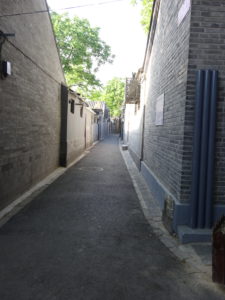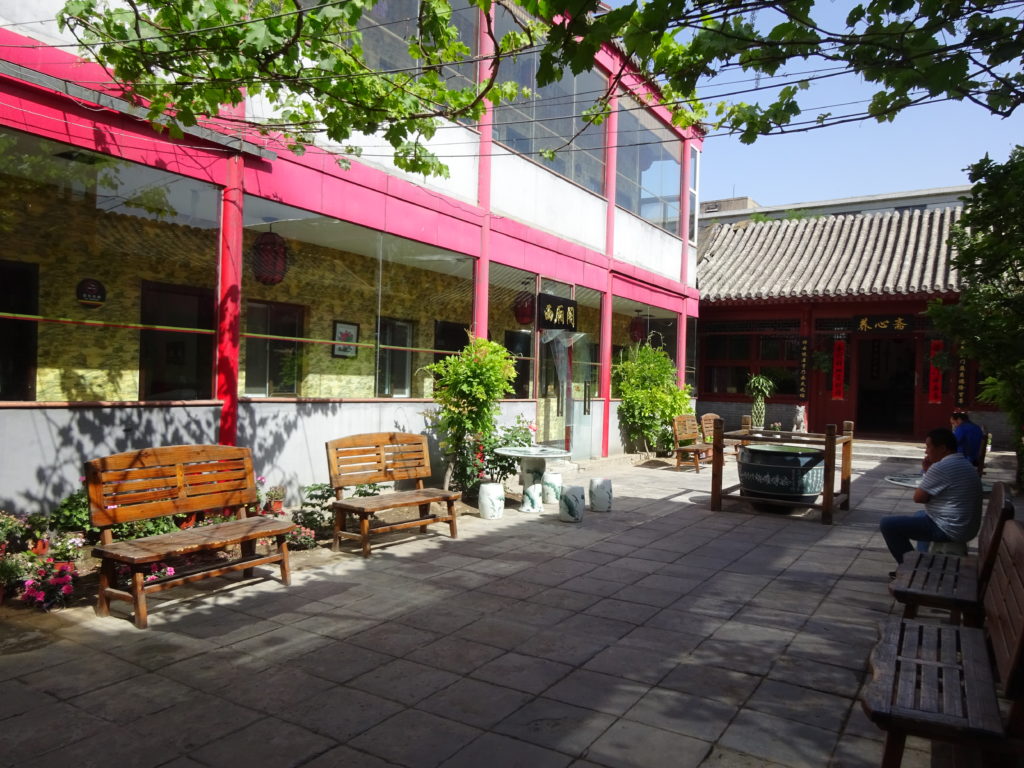 We thought we would try something different on this trip to Beijing. Rather than a western-style hotel we chose a small hotel in a traditional hutong. It was an experience I’ll never forget.
We thought we would try something different on this trip to Beijing. Rather than a western-style hotel we chose a small hotel in a traditional hutong. It was an experience I’ll never forget.
A hutong is an ancient alley dating back to the dynastic period of Beijing’s history. The word hutong is apparently derived from Mongolian, coined first during the Yuan Dynasty when Mongolian leader Kublai Khan controlled all of what is much of China, Korea, and parts of eastern Russian today. And alleys they are; narrow lanes with walls on both sides. Periodically you encounter a door, which leads to a central courtyard surrounded by tiny rooms in which various families live. These siheyuans line the hutong. Most of these siheyuans serve the poorer classes and lack toilets, which in modern times have been installed at points along the hutong and shared by all.
Our hutong hotel was on the upscale side, having been renovated to provide a larger than usual central courtyard and modern rooms (each with its own bathroom). Still, the rooms were tiny and the bathrooms were tinier. Late at night the locals just in from the outlying farms (in town to sell goods, perhaps) would arrive, their loud voices and arguments easily heard through the thin walls. Early morning risers added to the din, making sleeping an adventure.
For some reason we decided it would be a good idea to seek out our hotel in the darkened night of 10 pm. Ru’s sister met us at the nearby Ping’Anli Subway station and guided us to the hutong with her GPS. Without her we never would have found it, and the hutong entrance looked exactly like the kind of dark alley I would never (ever) have wandered down at night. After checking out the room she figured we were good for one night before changing our minds. We stayed five days, which shocked everyone, including us.

The One Belt, One Road Summit fell in the middle of our 10 days in Beijing. Proposed by Chinese President Xi Jinping, the One Belt, One Road initiative (OBOR for short) is a development project (call it a trade agreement) seeking cooperation between Eurasian countries. In town for the big meeting was Russian President Vladimir Putin and another 30 or so world leaders (nope, not the USA). Whenever bigwigs are in town the Chinese government shuts down factories and limits car driving in order to cleanse the normally thickly polluted air. We had beautiful clear blue sky for the entirety of our visit, a rarity. A few days after the OBOR meetings were over, the air had already started to get hazy again. It didn’t help that we had high 90 degree F temperatures for every day except two – and those two surpassed 100 degrees F.
After five days we decided that we had experienced enough of hutong life and got a room in a western hotel not far from the Beijing Book Building, a huge structure that makes the local Barnes and Noble stores look tiny. Down the road was Tiananmen Square and the Forbidden City, which was closed while the OBOR spouses toured. But that is a story for another time.
For those who want to experience a hutong without actually having to live in one, there are plenty of tours for foreigners offered by people roaming the usual tourist traps. One of the wider ones near the Bell and Drum Towers is called Nanluoguxiang and has been turned into a shopping street, but don’t mistake it for a real hutong. Wander off one of the side alleys to get a better flavor. Plan your walk to end up at Houhai, a beautiful lakefront road lined with plentiful bars and restaurants, all with live music.
Much more on Beijing and other travels on this page, so feel free to click around.
David J. Kent is the author of Lincoln: The Man Who Saved America, in Barnes and Noble stores now. His previous books include Tesla: The Wizard of Electricity (2013) and Edison: The Inventor of the Modern World (2016) and two e-books: Nikola Tesla: Renewable Energy Ahead of Its Time and Abraham Lincoln and Nikola Tesla: Connected by Fate.
Check out my Goodreads author page. While you’re at it, “Like” my Facebook author page for more updates!











It was funny when a guy approached us to offer a Hutong tour, we told him that we lived in one. 🙂 I guess the Hutongs in tours likely have historical significance and interesting stories, might worth checking out next time.
That was funny. I’ll save that story for the book. 🙂
Awesome! While I can’t say that I always stay in traditional accommodations, I think there’s often a great benefit. The place I’d recommend if you’re ever in Phnom Penh is like an upscale courtyard-house, off a narrow, hutong-like, side street not far from the Russian Embassy… though I suppose the swimming pool probably isn’t particularly traditional.
The “ryokan” probably fills the same function in Japan, though they vary a great deal in terms of accommodation. Really want to have the local experience, I also know where you can rent a stilted shack in the northern Thai mountains. You ‘ll be able to see the ground between the cracks in the floor, and winter heat is from an old TV that only receives Al-Jazeera. But it’s just up from an excellent, covered-outdoor bar/restaurant as well as the local indigenous morning market. (-_^)
As for “One Belt, One Road”, interesting to follow the money after the G20. It seems that about sixty countries are now involved to the tune of something like $8-trillion. Britain, Germany, France and Australia have all signed-on to the Asian Infrastructure Investment Bank. Now even Japan has signaled that it wants in. You can probably guess what isolationist nation has been conspicuously absent in all of this.
Too bad they weren’t having a meeting in Shanghai while I was there a few months back. It took about two weeks for my lungs to recover.
I’ll definitely check out the accommodations you suggest in Cambodia and Thailand, if I can ever get there. I wish I had tried a ryokan in Japan; next time.
The last time I was in Beijing you could see the chunks in the air. It pretty much rained the entire time the one trip I made to Shanghai. I would like to go there again, plus get to see more of the interior mountains.
Pingback: The Painted Buddy Bears of Stuttgart | Science Traveler